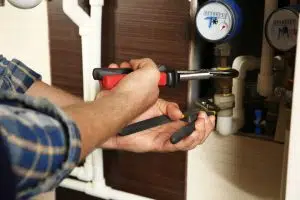
First and foremost, plumbing is a regulated industry, so plumbers for certain aspects such as gas work need to be properly licensed in order to operate. Secondly, plumbing can be a messy and dirty job, so it’s important to have the right insurance in place to protect yourself and your business. Finally, although the demand for plumbing services is high, the competition is also fierce, so it’s important to set yourself apart from the rest.
To become a successful plumber, you’ll need to be physically fit, enjoy working in different areas and have the correct skills to get the work done right. Starting and running a plumbing business is made easy by following the points within this guide.
Research your target market
If you are planning to start a plumbing business, you should consider who your potential customers will be and how competitive your industry is. You can accomplish this by conducting some market research.
Customers
Your services will likely be used by a large number of people.
Domestic work
Your area’s housing type should be considered. What is the size of houses, for example? How old are they? Are they well maintained, or do they seem to be in need of repair? Do some buildings have several flats? Is most of the housing owner-occupied or rented? Are some owned by the local authority or by a housing association?
Discover if there are any areas in your locality that are not connected to mains gas, if you intend to offer gas installation and maintenance services.
Work for other businesses and organisations
Take a look at the buildings around you. Plumbing services will be needed at some point by laundry facilities, shops, pubs, offices, factories, schools, etc. Determine which clients are most likely to use your services – a small plumbing firm may be more likely to be called in by a local shop than a grocery store.
You can direct your advertising efforts towards your potential customers once you identify them.
Contract work
Check your area for new housing developments or regeneration schemes before tendering for such a contract.
Large organisations may be reluctant to award contracts to newly established firms. As many things must be paid for before payment is received, a young business may have difficulty funding a large contract.
It may be worthwhile to find out who puts plumbing work out to tender in large companies such as housing associations and local authorities. You should learn how the tender process works if you want to tender for a contract.
Sub-contract work
Consider contacting other businesses that might need a plumber. You might consider leaving your details with a local building contractor or a plumbing company that needs subcontractors on a regular basis. On Yell.com and similar online directories, you can find information about these types of businesses in your area.
Specialist work
If solar heating installation and other renewables are in demand in your area, consider installing them. You may find that businesses and/or homeowners are interested in renewable energy technologies.
Establishing the level of competition
The next step is to find out how well your customers are already served.
What is the number of other plumbing firms in your area? You can find this out by browsing Yell.com and other similar online directories. Local print directories are also a good source of information. Is there a similar service offered by other companies? Direct competitors are those listed above.
Find out what your competitors are doing. From advertisements and websites, you can often get a sense of this:
- What services do they provide?
- Are there any special features advertised, such as no call-out fee, free estimates, guaranteed work, etc.
- Are they members of any trade associations, such as the Chartered Institute of Plumbing and Heating Engineering (CIPHE)
- How does their advertisement make you feel?
Decide which services to offer
Consider the range of services you will provide to your customers. To offer certain services such as gas installation, you will need special training, qualifications, and certificates. Make sure you and any staff are appropriately qualified at the beginning of your planning process.
Buildings both new and old may be part of your job description. You may decide to undertake the following types of work:
- Installation of sanitary fittings
- Installation of other appliances, such as jacuzzies, washing machines, water softeners, and garden watering systems
- Pipework and system repairs
- Gas appliance installation, maintenance, and testing
- Gas safety checks for landlords
- Landlords and other organisations need legionella inspections and risk assessments
- Including solar, air-source and biomass systems for water heating and central heating
- Flushing the central heating system
- Maintenance and installation of air conditioning systems
- Drain unblocking, surveys and repairs
- Emergency repairs
A particular type of work, such as launderette maintenance, may interest you. Then again, you might be able to do all the work that you are qualified to do.
Emergency services
Emergency services are likely to be available 24/7, 365 days a year if you decide to offer them. It is often necessary to repair leaks caused by frozen pipes in an emergency, unblock drains and toilets, and possibly repair heating systems. A prompt response is expected from emergency customers.
Added value services
Plumbing is a competitive industry, and you may decide to offer your customers additional ‘value added’ services. Examples include the following:
- Emergency callouts will be responded to within one hour
- There is no call out fee
- Estimates and quotations are free
- All work is backed by a written guarantee
- Status as an ‘approved contractor’ with the local water authority
- Membership of a recognised trade association
- A freephone number
- A ‘no job too small’ promise
Other types of work
In addition to the job you are performing, you will need to do other work, such as electrical work, replastering, tiling, and so forth. It is possible for you to do these tasks yourself depending on your skills and experience. You could also hire a subcontractor to do them.
Consider your work rate
The amount you can earn depends partly on how many days you work and how long your working day is assuming you get a steady flow of work.
Consider sticking to normal business hours, such as 8.30am to 5.30pm Monday through Friday and 8.30am to 1.30pm on Saturdays. Working longer hours may also be an option. In busy periods, you might be willing to work very long hours, taking some time off during quiet times.
Some plumbing companies provide emergency services 24 hours a day, such as repairing burst pipes. You must ensure that you can provide coverage at all times if you intend to offer this service. If you need help with emergency calls, you might decide to team up with another plumber.
Work rate
It is important for you to be aware of how long certain types of jobs will take you as an experienced plumber. Whenever you quote a job, it is very important to make an accurate estimate of how long it will take. If you quote for three days of work but end up spending five, it’s no good!
Depending on the type and standard of your work, and on your own skills and experience, you will work at a different pace. All these things should be reflected in your charges. If you have employees (if you have any), keep in mind that they may not be motivated to work as hard as you do. Be realistic in your expectations but strive to get the best out of them.
Non-productive time
It is unfortunate that not every working day will be spent earning money. Some of the reasons why you may find yourself working hard but not earning anything include:
- Visiting sites to cost new work
- Finishing off jobs that take longer than you had thought (possibly due to unforeseen problems)
- Re-doing faulty work
- Travelling to and from jobs, or to get tools or materials from a supplier
- Repairing tools or vehicles
In some cases, you may not be able to work at all because:
- You are waiting for materials to be delivered
- A vital tool or piece of equipment is broken
- You are ill
Estimate the maximum number of productive hours you can work each month based on all these factors.
Price your services
To decide your prices, you should first decide how you will charge for the work you do. You might, for example:
- If you supply materials, you might add a mark-up percentage to the cost of your services on an hourly or daily basis
- Fix the price per job; for example, installing a boiler and seven radiators, unblocking a drain or toilet, or attending an emergency call-out might be included in your quote
Depending on who the customer is and what the job entails, you may use different costing methods.
Setting your charges carefully is very important. Ideally, you should charge enough to cover all of your operating costs, including your drawings, assuming you get enough work. Qualifications and skills should be reflected in your charges.
When setting your charges, consider the following points:
- How much do your competitors charge for similar work?
- Is your goal to win business away from your competitors by offering attractive pricing
- Would you be able to vary your rate based on the type and complexity of the work involved?
- If you supply or buy goods or materials on behalf of your customers, will you make a profit or pass these on at cost (the same goes for subcontractors’ services)?
- For some types of jobs, will you charge a call-out fee
- For emergency work performed out of hours, will you charge a higher rate (for example, double time)
- Are you going to charge extra for certifying work covered by Building Regulations, or will you absorb the costs?
Quote or estimate
It is a fixed price if you give a quote for a job. It is impossible to change the price after a quote has been accepted by the customer, even if you have to do more work than you anticipated when you prepared it. You should make sure your quotes clearly state what is covered and that any variations or extras that are not included in the quote will be charged separately.
Estimates are not fixed prices; they are just your best guess at the cost of the project. It does not bind you. Providing multiple estimates, each taking into account different circumstances is perfectly acceptable.
Tell customers if unforeseen problems need to be rectified or extra features added to the specification could change the price for a job. During the course of a job, if the customer requests extra work, be clear about how this will affect the overall cost.
Estimates and quotes are usually provided free of charge without any obligation. Perhaps you will refund the charge if it leads to a substantial contract if you decide to charge for more complex and time-consuming consultancy work.
Trade rates
Your clients who are other businesses might expect you to give them a special ‘trade rate’. Insurance companies and large organisations will expect your rates to be very competitive if they invite you to bid for contract work.
Several plumbing firms will offer quotes to your clients, so you need to quote accurately and competitively. Be sure not to damage yourself here though. Good, efficient service is valued by many clients, and they are willing to pay a reasonable price for it. Be sure your quote isn’t too low if you don’t want to end up losing money!
When pricing plumbing work, you can use special guides. Depending on the type of job, they provide up-to-date advice on what rate to charge.
Promote your business
The most important thing you can do for your business is advertise effectively, so your potential customers know who you are, where you are, and what you can do for them.
Your customers may not require plumbing services regularly and may not have the name of a plumber in mind. Particularly when there is an emergency, customers won’t want to spend a lot of time looking for a plumber and will usually call the first reputable company they see.
Advertising and marketing
Considering how many people search for plumbers online, a good website can be an excellent way to advertise your business. Consider listing your business in online directories, such as ‘contact an expert’ directories.
Your business can also take advantage of social media to market itself, stay in touch with previous customers, and reach out to potential new clients. You might also consider using relevant forums and a blog (although keep in mind that some forum websites prohibit blatant advertising). Checkatrade, for example, is a website that reviews tradespeople. Job-referral websites like Mybuilder.com and Rated People may also be able to help you find work.
Your business can be effectively advertised in a local print directory. Try to differentiate your business from your competitors because many will have done the same.
The display advertisements of some companies are large and eye-catching. To attract customers, you will need to decide whether to compete head on with these firms or to look for a different approach.
Make sure your advertising material emphasises your unique selling point (USP).
Other ways of advertising
You may find advertisements for ‘contact the experts’ in your local paper. Keep your vehicle clean and presentable, and you can use it as an effective advertising tool. You might want to consider getting a sign made to put outside the premises where you work. However, you should always ask the householder’s permission before doing this. A plumber may send a flyer to applicants who are managing the project themselves in case they are interested in employing their services.
You could also:
- When you get a new customer – particularly one requiring emergency repair work – hand out a fridge magnet, plastic card or sticker with your business name and telephone number on it
- Try becoming an ‘approved tradesperson’ by joining an insurer, water company, a specialist helpline or directory (most of these companies operate quality screening processes and some only list companies that have been trading for two years or more).
- It is common for lettings to be older properties that need remedial work and ongoing maintenance. Consider becoming a National Landlords Association-recognised local supplier
Word of mouth
Your business will benefit greatly from word-of-mouth recommendations. Cowboy tradesmen are notorious for bodge jobs and swindling their customers, and your customers want assurances that you’re not going to do the same to them. Even small things like politeness and considerateness can pay big dividends in earning your reputation through good, reliable workmanship. You should make sure that the employees you hire are good ambassadors for your business as well.
Buying an existing business
Rather than starting your own farm supply business from scratch, you might want to buy an existing one. A going concern can mean that the company already has products, customers, regular sales, staff, premises, and equipment.
If you do not have the right legal and financial expertise on your team, buying a business can be a hazardous, expensive process one way is to find a local accountant who can assist you with the financials. The price of the business should not be too high if you establish the genuine trading and financial position of the company.
Jarred Musson is a versatile writer with a diverse educational background and a passion for all things business. Holding a Master of Science (MSc) degree in Marketing and a Bachelor of Arts (BA Hons) in Multimedia Journalism from Manchester Metropolitan University, Jarred possesses a unique blend of expertise that allows him to dissect and communicate complex business topics with clarity and precision.


